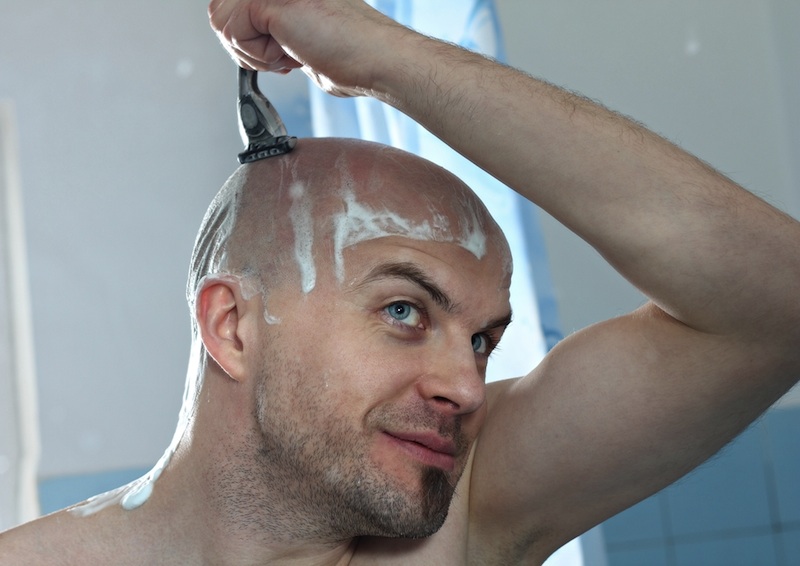The Power Cut: Men With Shaved Heads Look More Dominant

A full head of hair on a man has long been associated with vitality and virility — think of the Biblical hero Samson, whose strength was in his tresses. But new research suggests that when balding sets in, men might do better to just shave it off.
Call it the Bruce Willis effect: men with shorn heads are seen as more dominant, confident and masculine than men with hair, according to a new study published online in July in the journal Social Psychological and Personality Science. A shaved head does strike a blow against a man's perceived attractiveness, however. So study researcher Albert Mannes, a lecturer at the Wharton School at the University of Pennsylvania, advised against picking up the razor unless natural balding is already underway.
In that case, Mannes told LiveScience, "there's little downside to at least trying the look."
A dominant hairstyle
Mannes was inspired by personal experience to research shaved heads. About 10 years ago, he said, he adopted the shorn look himself.
"Strangers started treating me differently," Mannes said. "They were a little more standoffish and, in some cases, deferential, and I was surprised by that."
A number of studies have examined the characteristics that lead people to perceive dominance, from height and posture to eye color (brown, apparently, is more dominant than blue). Most of these traits are fixed, Mannes said, but hair is particularly interesting because it's malleable.
Sign up for the Live Science daily newsletter now
Get the world’s most fascinating discoveries delivered straight to your inbox.
In a series of three studies, Mannes asked participants to rate men with different hairstyles on a number of different traits, such as dominance, attractiveness, age and physical strength. In the first study, 59 female university students saw pictures of 25 men, both black and white. Ten of the men had shaved heads, while the others had various hair lengths, but no visible signs of balding. The shorn men were consistently ranked as more dominant, the study found.
The last two studies relied on panels of adult Americans recruited online. In the first, 367 adults rated eight photographs of the same men from the first study. Half of the participants saw original photos with hair, and the other half saw photos that had been doctored so the men's heads looked shaved. Dominance, masculinity, age, height, physical strength and confidence were all ranked higher in the shaved versions. In fact, shaved men were viewed as nearly an inch taller and 13 percent stronger than their counterparts who had hair. They were also seen as less attractive, however.
Finally, Mannes dispensed with photographs altogether. In the last study, 588 adults read a description of a normal man. In one version, the man was described as having a full head of hair. In another, he had naturally thinning hair, and in a third, he had shaved his head. Again, the shorn man was seen as more dominant, more masculine and stronger, while the naturally balding man was ranked lowest in desirable traits. [10 Crummy Hereditary Conditions]
Men of action
In large part, these perceptions likely stem from cultural stereotypes, Mannes said.
"In the U.S., especially over the last 10 years, the shaved-head look has become very prominent in traditionally masculine professions," he said. "The military, of course, law enforcement and, these days, professional athletes sport the look a lot."
Hollywood action stars, from Bruce Willis to Jason Statham, also make shaved heads look tough, Mannes said. In other countries, such as the United Kingdom, he warned, the look might be more associated with skinhead culture and thus appear less desirable.
A shaved head may also signal that a man is confident enough to give up his hair, Mannes said. Because a full head of hair is valued in our culture, the choice to voluntarily shave suggests that the person is secure enough not to need that trait, he said.
"They're willing to dispense with this symbol of beauty and power," he said.
Does that mean women should shave their heads, too? Not necessarily, Mannes said, though sending out signals of dominance and confidence could be as simple as adding a few out-there accessories.
"I do think it has other implications for women, like [that] unconventional dress or funky eyeglass frames may send signals about how confident you are as a person," Mannes said.
Follow Stephanie Pappas on Twitter @sipappas or LiveScience @livescience. We're also on Facebook & Google+.

Stephanie Pappas is a contributing writer for Live Science, covering topics ranging from geoscience to archaeology to the human brain and behavior. She was previously a senior writer for Live Science but is now a freelancer based in Denver, Colorado, and regularly contributes to Scientific American and The Monitor, the monthly magazine of the American Psychological Association. Stephanie received a bachelor's degree in psychology from the University of South Carolina and a graduate certificate in science communication from the University of California, Santa Cruz.









